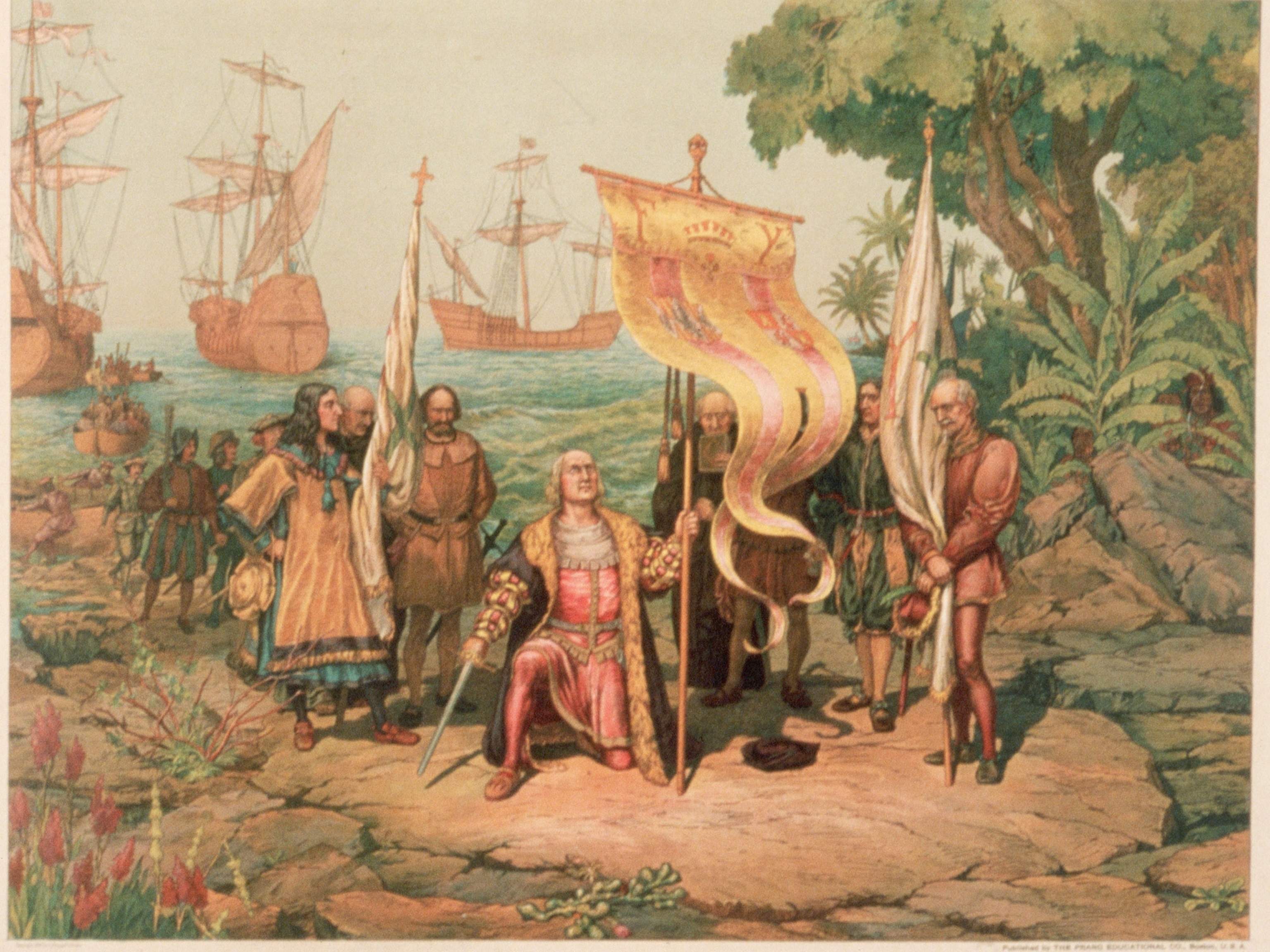
What is colonialism?
The subjugation of indigenous people—and the exploitation of their land and resources—has a long and brutal history.
Colonialism is defined as “control by one power over a dependent area or people.” It occurs when one nation subjugates another, conquering its population and exploiting it, often while forcing its own language and cultural values upon its people. By 1914, a large majority of the world's nations had been colonized by Europeans at some point.
Japan, Korea, and Thailand are the only other nations never to have been colonized by Europeans.
The concept of colonialism is closely linked to that of imperialism, which is the policy or ethos of using power and influence to control another nation or people, that underlies colonialism.
History of colonialism
In antiquity, colonialism was practiced by empires such as Ancient Greece, Ancient Rome, Ancient Egypt, and Phoenicia. These civilizations all extended their borders into surrounding and non-contiguous areas from about 1550 B.C. onward, and established colonies that used the physical and population resources of the people they conquered to increase their own power.
In Ancient Greece, for example, city-states often established colonies in search of both extra living space and economic gain. After consulting an oracle, members of the city-state would send a select group of its inhabitants to establish a new colony. To seal the association between colony and city, its founding members would light a fire with a flame taken from the original city’s central hearth and engage in other rituals laying claim to the new location.
During what is now known as the Age of Discovery, founding a new colony depended on another ritual: gaining the sponsorship of a wealthy patron, usually a monarch, and embarking on large ships to search for unceded land. Beginning in the 15th century, Portugal began looking for new trade routes and searching for civilizations outside of Europe. In 1415, Portuguese explorers conquered Ceuta, a coastal town in North Africa, kicking off an empire that would last until 1999.
Soon the Portuguese had conquered and populated islands like Madeira and Cape Verde, and their rival nation, Spain, decided to try exploration, too. In 1492, Christopher Columbus began looking for a western route to India and China. Instead, he landed in the Bahamas, kicking off the Spanish Empire. Spain and Portugal soon became locked in competition for new territories and took over Indigenous lands in the Americas, India, Africa, and Asia.
The rest of Western Europe swiftly followed: England, the Netherlands, France, and Germany quickly began their own empire building overseas, fighting Spain and Portugal for the right to lands they had already colonized.
Often, the colonies were wrested from the hands of their Indigenous inhabitants by relatively small parties of European men who lay claim after short skirmishes or by intimidating locals with their vessels, weapons, and trade items. For example, Columbus’ crew for his famous 1492 voyage consisted of just 90 men, 39 of whom he left behind to build a settlement in what is now Haiti.
Subjugation and revolutions
Among the allures of colonialism was the chance to recruit—and often enslave—Indigenous people to benefit a colonial power. In Brazil, for example, explorers called bandeirantes embarked on expeditions in search of Native people to capture and enslave for Portuguese-established plantations and mines. And slavers from throughout Europe participated in the Atlantic slave trade, dealing in kidnapped Central and West Africans and forcing them to perform labor that enriched their empires overseas.
Even former colonies eventually became colonizers themselves: The U.S., which was formerly held by Great Britain, extended its territory shortly after winning the War of Independence and later expanded its claims to the Pacific and Latin America.
Starting in the 1880s, European nations also began taking over African nations, racing to coveted natural resources and establishing colonies they would hold until an international period of decolonization that lasted from around 1914 to 1975 and challenged European rule
By far, the most successful colonizer was the British Empire, which at its height soon after World War I could boast territories in every time zone in the world. The sun “never set” on England’s political and economic ambitions, which it carried out with the help of British colonial governments.

Despite the growth of European colonies in the Western Hemisphere, most colonized countries gained independence during the 18th and 19th century, beginning with the American Revolution in 1776 and the Haitian Revolution in 1781. However, the Eastern Hemisphere continued to tempt European colonial powers.
Colonial rationale and resistance
Colonial powers justified their conquests by claiming they had a legal and religious obligation to control the land and culture of Indigenous peoples. Conquering nations cast their role as civilizing “barbaric” or “savage” nations, and argued that they were acting in the best interests of those whose lands and peoples they exploited.
Historically, church leaders both encouraged and participated in the takeover and exploitation of foreign lands and labor, most often in the name of Christian conversion. In the 15th century, Catholic popes laid out a religious justification for colonization, issuing a series of papal bulls now known as the Doctrine of Discovery that asserted colonization was necessary to save souls and seize lands for the growth of the Church. Often, Christian missionaries were among the first to make inroads into new lands. Inspired by the belief that they must convert as many Indigenous people to Christianity as possible, they imported both religious and cultural customs and a paternalistic attitude toward the colonies’ Native inhabitants.

Yet resistance to this control is an integral part of the story of colonialism. Even before decolonization, Indigenous people on all continents staged violent and nonviolent resistance to their conquerors. These included the Pueblo Rebellion overthrowing Spanish rule of what is now New Mexico in 1680, the slave revolt turned revolution in Haiti in 1791, a series of rebellions against English rule in India, and many other instances of collective and personal resistance.
Ethiopia was able to remain one of just two African nations to sidestep European colonial rule due to a series of savvy alliances forged by its emperor, and in 1896 the nation managed to stave off an Italian invasion at the Battle of Adwa.
Colonialism’s legacy
Colonial governments invested in infrastructure and trade and disseminated medical and technological knowledge. In some cases, they encouraged literacy, the adoption of Western human rights standards, and sowed the seeds for democratic institutions and systems of government. Some former colonies, like Ghana, experienced a rise in nutrition and health with colonial rule, and colonial European settlement has been linked to some development gains.
However, coercion and forced assimilation often accompanied those gains, and scholars still debate colonialism’s many legacies. Colonialism’s impacts include environmental degradation, the spread of disease, economic instability, ethnic rivalries, and human rights violations—issues that can long outlast one group’s colonial rule.
As South Asia historian John McQuade writes, “It takes a highly selective misreading of the evidence to claim that colonialism was anything other than a humanitarian disaster for most of the colonized.”
You May Also Like
Go Further
Animals
- Octopuses have a lot of secrets. Can you guess 8 of them?
- Animals
- Feature
Octopuses have a lot of secrets. Can you guess 8 of them? - This biologist and her rescue dog help protect bears in the AndesThis biologist and her rescue dog help protect bears in the Andes
- An octopus invited this writer into her tank—and her secret worldAn octopus invited this writer into her tank—and her secret world
- Peace-loving bonobos are more aggressive than we thoughtPeace-loving bonobos are more aggressive than we thought
Environment
- Listen to 30 years of climate change transformed into haunting musicListen to 30 years of climate change transformed into haunting music
- This ancient society tried to stop El Niño—with child sacrificeThis ancient society tried to stop El Niño—with child sacrifice
- U.S. plans to clean its drinking water. What does that mean?U.S. plans to clean its drinking water. What does that mean?
- Food systems: supporting the triangle of food security, Video Story
- Paid Content
Food systems: supporting the triangle of food security - Will we ever solve the mystery of the Mima mounds?Will we ever solve the mystery of the Mima mounds?
History & Culture
- Strange clues in a Maya temple reveal a fiery political dramaStrange clues in a Maya temple reveal a fiery political drama
- How technology is revealing secrets in these ancient scrollsHow technology is revealing secrets in these ancient scrolls
- Pilgrimages aren’t just spiritual anymore. They’re a workout.Pilgrimages aren’t just spiritual anymore. They’re a workout.
- This ancient society tried to stop El Niño—with child sacrificeThis ancient society tried to stop El Niño—with child sacrifice
- This ancient cure was just revived in a lab. Does it work?This ancient cure was just revived in a lab. Does it work?
Science
- The unexpected health benefits of Ozempic and MounjaroThe unexpected health benefits of Ozempic and Mounjaro
- Do you have an inner monologue? Here’s what it reveals about you.Do you have an inner monologue? Here’s what it reveals about you.
- Jupiter’s volcanic moon Io has been erupting for billions of yearsJupiter’s volcanic moon Io has been erupting for billions of years
- This 80-foot-long sea monster was the killer whale of its timeThis 80-foot-long sea monster was the killer whale of its time
Travel
- How to plan an epic summer trip to a national parkHow to plan an epic summer trip to a national park
- This town is the Alps' first European Capital of CultureThis town is the Alps' first European Capital of Culture
- This royal city lies in the shadow of Kuala LumpurThis royal city lies in the shadow of Kuala Lumpur
- This author tells the story of crypto-trading Mongolian nomadsThis author tells the story of crypto-trading Mongolian nomads







